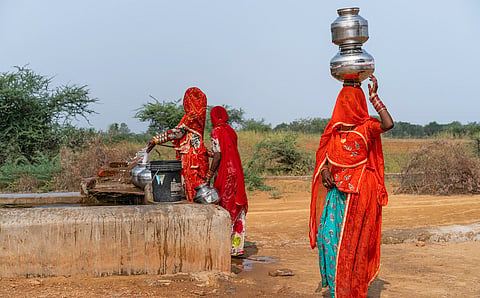

Will policy decisions help women get a decision-making role to combat desertification in a climate-risked world? That question is up for deliberation at the ongoing 16th Conference of Parties (COP16) to the United Nations Convention to Combat Desertification (UNCCD) in Riyadh, Saudi Arabia.
A consensus was reached at the UNCCD COP15 in Abidjan, Côte d’Ivoire that the Gender Caucus was an effective platform to strengthen and accelerate gender conversation, policy, programme and agenda and hence the Convention’s initiative to effectively implement the Gender Action Plan (GAP) at international and country level.
The Gender Caucus was established and convened at UNCCD COP14 in New Delhi in 2019, comprising of Parties, selected UN agencies and civil society organisation partners, to provide expert guidance on how to focus strategies on gender issues in drought, land degradation and desertification.
It was the adoption of the GAP at UNCCD COP13 in China’s Ordos in 2017 that acknowledged a specific role for women in land restoration and sustainable land management, the importance of gender equality as a guiding principle in all policies and decisions associated to the fulfilment of the objectives of the Convention.
In 2022, a study commissioned by UNCCD and titled The differentiated impacts of desertification, land degradation and drought on women and men delved into why desertification is not gender-neutral.
“Women are major actors in the global efforts to reduce and reverse land degradation. They restore land, they protect land, they cherish, nourish and care for the land, while also caring for others,” Ibrahim Thiaw, under-secretary-general and executive secretary of UNCCD, explained in the study.
The study brought forth the issues faced by women in land rights, access to resources, education, knowledge, training and skill and participation in decision-making processes.
A study in Sri Lanka highlighted that only three per cent women held positions of leadership in the agriculture sector due to lack of land ownership, neglect of specific gender needs in irrigation, migration of male relatives in the family, and women having less power and voice than men.
The analysis also cited that in Afghanistan, while 70 per cent of men reported being consulted about their needs, nearly 70 per cent of women had not been consulted.
It also showed that there is increased burden on women during times of disasters.
For instance, food security affects women in times of drought and land degradation as they tend to eat less or skip meals, leading to other after-effects.
Carrying water for long distances exposes them to musculoskeletal disorders and related disabilities.
Drought-related migration may make women overburdened and incapable of taking decisions on drought-related agricultural improvements
Women workers are also susceptible to more abuse and exploitation. Female farmers, entrepreneurs and women’s organisations are under-represented in major land restoration initiatives, programmes and policy processes.
At COP16 Riyadh, host Saudi Arabia has showcased its progress so far with regard to issues of women and desertification.
The country is pushing its way to bring women to take key decisions to combat the effects of drought. “Only in 2018 did we get the permission to drive in Riyadh, but rural women were found to drive in the deep deserts to meet their needs much before,” said Princess Mashael, co-founder of Saudi Arabia based non-profit Aeon Collective.
She added that these women have a good understanding of deserts as they are closely connected to the ecosystem.
The National Observatory for women under the Princess Norah University of Riyadh is developing an index to measure women participation in climate issues.
“This is a very welcome step,” added Maimoonah Al Khalil, secretary general, Family Affairs Council of Riyadh. Al Khalil was once part of this index and opines that this index is good for any country to calculate such a contribution. Currently, the researchers are collecting real time data.
Women had been the centre of government programmes like sustainable agricultural rural development program (Reef), where they were 63 per cent of the beneficiaries, said Al Khalil.
The Reef programme under the Saudi ministry of environment, water and agriculture has contributed to increasing the number of women participating in rural activities.